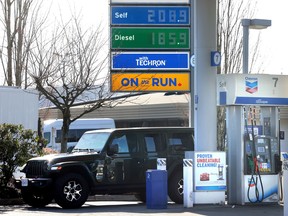Metro Vancouver gas pump price hits almost $2.09 a litre after B.C. carbon tax increase April 1.

Article content
As the provincial carbon tax goes up, changes are also coming for who qualifies for tax rebates.
It’s estimated that around 65 per cent of people in B.C. will qualify for the climate action tax credits aimed at low- to middle-income earners.
Article content
On Monday, B.C. raised its carbon tax by 23 per cent, to $80 a tonne from $65 a tonne, an amount that the B.C. NDP government said represents an increase of about three cents a litre.
Advertisement 2
Article content
Gas prices across Metro Vancouver jumped to almost $2.09 a litre on Monday as the carbon tax increase came into effect, although there were a few stations charging a few cents below the high of that price.
The province’s carbon tax has been in place for 16 years and was first implemented by the B.C. United party, then known as the B.C. Liberals, in 2008.
For those who qualify for the tax credits, the amount received is based on household size and net income.
Currently, a single person with a take-home income of less than $39,000 gets a maximum credit of $447 this year, which is divided into quarterly payments made in July, October, January and April. The payments get smaller the more a single person makes until $61,000 a year, at which the credit is zero.
These rebates and thresholds will increase in July, so that a single person will get $504 if they make less than $41,000 a year.
A family of five with two parents and three children with take-home pay of less than $50,000 a year currently qualifies for about double the amount of the tax credit a single person, at about $1,003 a year. The payments get smaller as the family’s household income increases until $100,420 a year, at which the credit is zero.
Article content
Advertisement 3
Article content
That will change in July. The new thresholds for the maximum net income a year a single person or a household of five can make before the tax credit is zero haven’t yet been published, said Kathryn Harris, a University of B.C. political science professor, who specializes in environmental, climate and energy policy.
She is expecting they will be in the ballpark of in the low $60,000 range for a single person and to just above $100,000 a year for a household of one or two income-earners and three dependents, which is about median income.
B.C.’s carbon tax rebate program is separate and different from the federal carbon rebate, which is new in 2024 and active in eight provinces: Alberta, Saskatchewan, Manitoba, Ontario, New Brunswick, Nova Scotia, P.E.I., and Newfoundland and Labrador.
The main distinction between the carbon tax rebates being issued by the federal government to these eight provinces and B.C.’s system is that B.C. assesses income and household size while Ottawa gives rebates based on the amount collected in each province and, from there, only looks at household size, according to Harris.
Advertisement 4
Article content
She said that the federal government distributes 90 per cent of carbon tax revenues it takes in through its rebate.
Even though the federal program doesn’t overtly put emphasis on giving rebates based on income, some 80 per cent of households get more from the rebates than they pay out in carbon tax. This happens because the 20 per cent of households at the top of the range by income pay the most in carbon taxes because they use more fuel, said Harris.
Harris said it’s not straightforward to compare B.C.’s carbon tax rebates with the federal program. If a government doesn’t return carbon taxes collected through rebates, it may be spending it in other areas such as education and health care.
Recommended from Editorial
Bookmark our website and support our journalism: Don’t miss the news you need to know — add VancouverSun.com and TheProvince.com to your bookmarks and sign up for our newsletters here.
You can also support our journalism by becoming a digital subscriber: For just $14 a month, you can get unlimited access to The Vancouver Sun, The Province, National Post and 13 other Canadian news sites. Support us by subscribing today: The Vancouver Sun | The Province.
Article content





